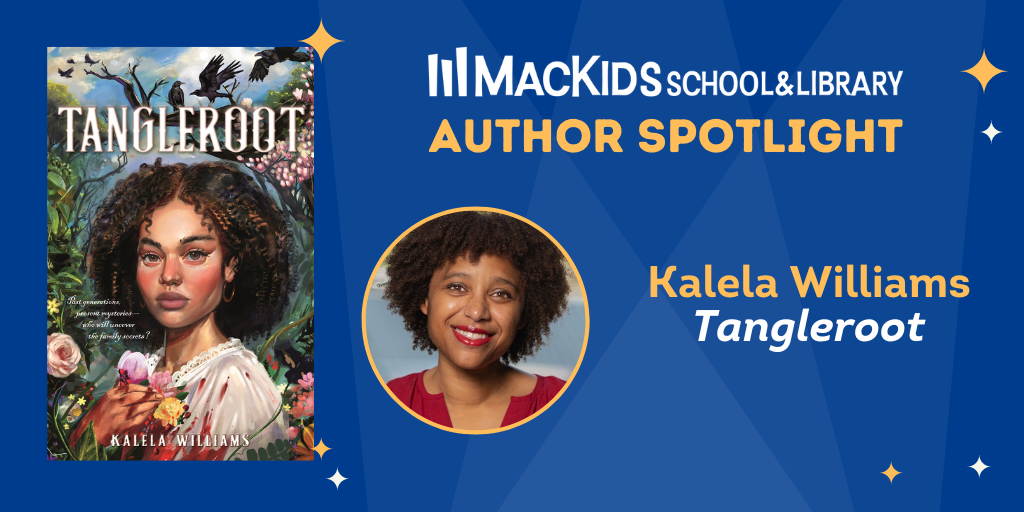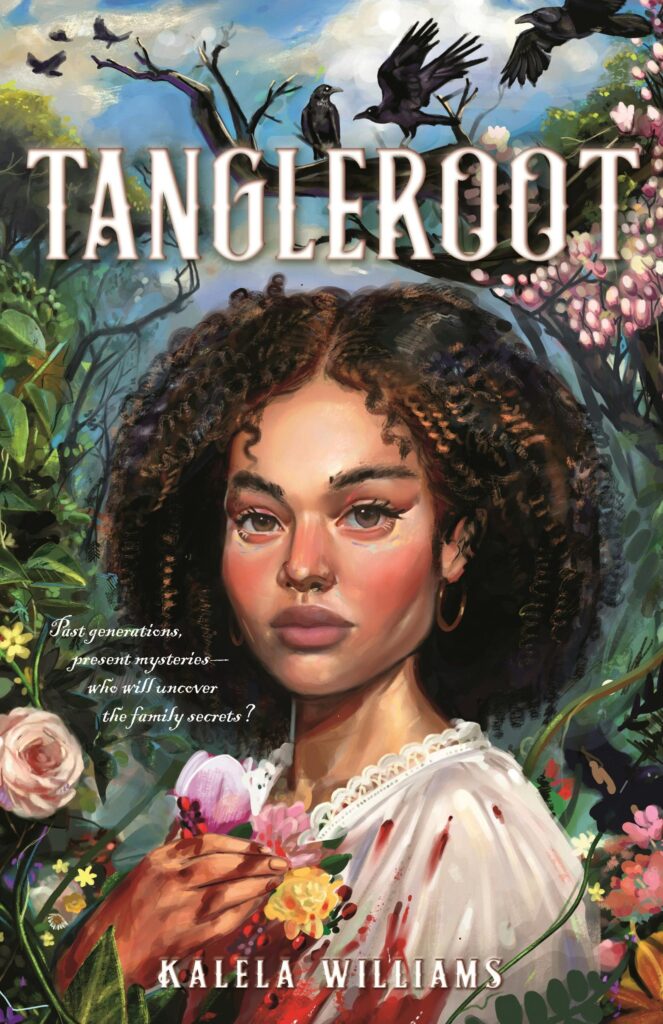
This month’s Author Spotlight highlights Kalela Williams, author of Tangleroot, a debut YA novel about a girl who must face hard truths about blood and family, history and mystery.
What was your inspiration behind this book?
Kalela: When I was thirteen years old, I visited the burial grounds of a former plantation’s enslaved community, one previously lost in the overgrowth of woods. Because the people buried there were denied an education, their graves were marked with rock pilings or field stones. I could not know their names. There were other inspirations behind Tangleroot, but this memory is the oldest one that was the novel’s spark, and it’s a memory I’ll never forget.
What is one thing that you want your readers to take away from this book?
Kalela: My protagonist, Noni, discovers the history of her town, her home, the community it once stood upon, her mother, and herself. To do this, she talks to elders, and she finds primary sources, which, of course, are first-hand accounts of people who lived during a particular time, like diary entries. She doesn’t have to sneak into a stranger’s house to access an old attic or break into a vault. She uses publicly available documents online or in historical societies and libraries. I hope my readers see this as an invitation to talk to the elders in their communities and to peek into the sources available to them!
In your author’s note, you discuss the research you put into this book. How does research work with word-of-mouth stories?
Kalela: Because enslaved people were almost always barred from access to literacy, our histories were often never written down. Oral histories are so important. My protagonist relies on the histories of a town elder, Valerie, who in turn recorded other town elders. In many cases, these fictional women are able to corroborate these stories with written bits and pieces. True life research doesn’t always work this way, of course, which is why it’s important to know the generalities of a time period.
How did you decide what would be fictionalized or real regarding Euphemia’s narrative and Sophie’s diary?
Kalela: Almost all of Sophie’s diary and Euphemia’s narratives are fictional, but I leaned into real women’s voices of the time period. I wanted to tell a story that fits within my fictional modern-day story needs but also be true to what someone like Sophie or Euphemia would have experienced, which, of course, are starkly different from one another. Real-life Margaret Junkin Preston, a Southern white woman, remarked condescendingly about the wedding of her enslaved servant, who she called “Rhinie.” Real-life formerly enslaved women, in narratives taken down in the 1930s, spoke of being denied so many freedoms, even something as fundamental as the freedom to live as husband and wife.
Tangleroot consistently highlights the significance of addressing complex historical topics, emphasizing that despite their challenging nature, they play a vital role in education. Why do you believe discussing challenging subjects is essential?
Kalela: Noni doesn’t, right off the bat, believe that we should confront controversial histories, but she asks questions. And the question it comes down to for her is, what are people afraid of? And that’s where I am. If we shy away from teaching history–true history–then we lose. We lose the knowledge of what happened and how that past touches us today. But what do we lose if we tell the truth? I can’t think of anything. As a child, I learned to tell the truth. And that life lesson we all take for granted really should hold fast today.
The exploration of family history is a significant aspect of Tangleroot. What guidance would you provide to individuals seeking to uncover their family history, particularly for Black Americans facing challenges tracing their lineage back several decades?
Kalela: Before the 1870s, enslaved people were counted as property. If you’re lucky, you might visit a local archive, or even find online, ledgers that enslavers kept. But they didn’t always keep names. For instance, I have found a ledger of a white family named Bowman who lived in the same area where my grandmother’s grandmother Sophronia grew up, and they enslaved a fourteen-year-old girl who would have been Sophronia’s age. But was she MY great-great-grandmother? I do not know, and I may never. But now, there are so many trained genealogists who are skilled at tracing back these almost invisible histories, and even genealogical societies devoted to uncovering Black ancestry. So my first advice is to make connections with them.
What part of the debut author experience surprised you the most?
Kalela: I think the biggest was feeling like, “Holy *&#%, I’ve found my calling!” That happened at my very first author event, when I sat down to sign galleys. I work in author events for a living, so I’ve probably worked the lines of more than a hundred book signings, where I’ve flapped hardbacks to the right page and kept the author stocked with Sharpies and water. But to be sitting behind the table, talking with people who wanted to read my book? You know when you see a dog in a car with its head out the window and its tongue cruising out of its mouth? That was me, though I’m proud to say I did not drool a drop. I knew it would be exciting. I didn’t expect it to be one of the single best experiences of my existence.
Tell us about a librarian or educator who made an impact on you.
Kalela: The list is so long. I will choose two. Both had the last names of Williams, though they were not related. First, my mother, who died in 2012, was my social studies teacher in the sixth grade at Woodland Middle School near Atlanta, Georgia. She impressed upon me and my siblings to always be curious, and to study the past for its lessons. She’s the reason behind my love of history and reading. Also, when I was in the second and third grades, a librarian, Mr. Williams, held a weekly book circle. My siblings, both older, had talked all about him, so I couldn’t wait to be old enough to join. I learned the meaning of the word “copyright” from him, and what third grader knows that? He was one of the few white educators at Utoy Springs Elementary School, and elderly even back then. He would be gone, too, so I cannot thank him.
What was your favorite book when you were a young reader?
Kalela: I read so much, from light and airy and fluffy stuff to classics like Little Women or Roll of Thunder Hear My Cry, to literal encyclopedias (we had a set, and I’d just randomly pull one from the shelf. I was that kid). When I was Noni’s age, I got a paperback of Margaret Walker’s Jubilee from a used bookstore, one with a gloriously dramatic mid-1980s cover. I read this novel over and over until it fell apart.
ABOUT THE AUTHOR

Kalela Williams has always loved books, cats, and history. As a child, she began scrawling stories in marbled composition books. As a teenager, she’d blow out her birthday candles and wish for a greater light—to illuminate history through fiction, which makes her debut novel, Tangleroot, literally a dream come true. Kalela has made a career in literary events, directing everything from the citywide read program One Book, One Philadelphia, to the Virginia Festival of the Book. Originally from Atlanta, Georgia, Kalela now lives in the central Virginia town of Staunton with her partner, with who she runs a story-centered organization, The Off Center. Kalelawilliams.com
ABOUT THE BOOK

Tangleroot
by Kalela Williams
Ages 14-18
On Sale October 15th!
In this debut novel, chosen by booksellers as an Indies Introduce selection, a girl must face hard truths about blood and family, history and mystery.
Noni Reid has grown up in the shadow of her mother, Dr. Radiance Castine, renowned scholar of Black literature, who is alarmingly perfect at just about everything.
When Dr. Castine takes a job as the president of the prestigious Stonepost College in rural Virginia, Noni is forced to leave her New England home and, most importantly, a prime internship and her friends. She and her mother move into the “big house” on Tangleroot Plantation.
Tangleroot was built by one of Noni’s ancestors, an enslaved man named Cuffee Fortune—who Dr. Castine believes was also the original founder of Stonepost College, and that the school was originally formed for Black students. Dr. Castine spends much of her time trying to piece together enough undeniable truth in order to change the name of the school in Cuffee’s honor—and to force the university to reckon with its own racist past.
Meanwhile, Noni hates everything about her new home, but finds herself morbidly fascinated by the white, slaveholding family who once lived in it. Slowly, she begins to unpeel the layers of sinister history that envelop her Virginia town, her mother’s workplace, her ancestry—and her life story as she knew it. Through it all, she must navigate the ancient prejudices of the citizens in her small town, and ultimately, she finds herself both affirming her mother’s position and her own—but also discovering a secret that changes everything.


